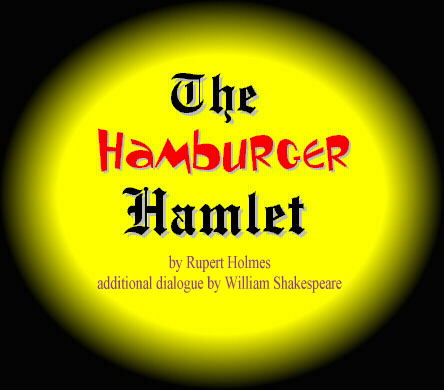The Hamburger Hamlet

THE HAMBURGER HAMLET, a play for young actors in their mid-teens to mid-twenties, is one of Rupert Holmes’ most unusual conceptions. Holmes originally began work on the piece for producer Joe Papp’s “Shakespeare on Broadway for the Schools” project at the Belasco Theatre, where an all-student company helmed by Estelle Parsons was performing Shakespearean works in repertory. However, this fine enterprise ended before Rupert had a chance to complete the work, and so he temporarily set it aside.
In 1990, Paul Brown (who had previously served as an assistant to Rupert on THE MYSTERY OF EDWIN DROOD and had gone on to work with Josie Abady at the Cleveland Playhouse) had the opportunity to direct a play for the Drama Department of Cleveland University. As thanks for his efforts on DROOD, Rupert finished THE HAMBURGER HAMLET for his troupe even as he rehearsed the Broadway production of his comedy-thriller ACCOMPLICE. Its giddy lunacy delighted its audiences and received much critical acclaim. It has since been performed at a number of enlightened universities who aren’t afraid to put Hamlet through the meat grinder.
THE PREMISE: It is the not-too-distant future. The decimation of the earth’s ozone layer has rendered the face of our planet uninhabitable during the daylight hours. Among the few human survivors of this ecological Armageddon are the students of a California junior-senior high school who live in the sub-levels of their high school. They survive within a society founded upon the constitution of their student government, where the senior citizens are Seniors, where Freshman are fair prey for all, and where the Safety Patrol is dedicated “to protect you and hurt you.”
The one collective yearning of the student body is to reclaim their lost culture. All they know of the world that might have been theirs has come from magazines and shopping circulars found in the aisles of the abandoned supermarkets where they forage for canned food after the sun has set.
Most of all they long to discover what is this play called “The Hamlet” by Mister William Shakespeare, purportedly the greatest play ever written. To piece together this extinct masterpiece, they have but two tools. The first is a paperback Folger edition, missing all but eight or nine of its pages. The second is “The Tape” — a video cassette they’ve discovered on one of their nightly expeditions, on which can be found the Laurence Olivier film version of HAMLET as it aired on a local TV channel. One minor flaw: the original TV viewer was restlessly flipping channels as he recorded, so Shakespeare’s timeless words are constantly interrupted by TV games shows, commercials for fast food chains and weekend weather updates. However, to the unenlightened minds of the students, this is all part of the play.
We are now attending the high school’s yearly School Assembly, an important ritual in the student’s lives which traditionally concludes with some sort of entertainment. We notice in the Pledge of Allegiance the way language (in the absence of any oral practicioners) has been corrupted and corroded by the prevalence of the previous generation’s advertising.
PLEDGE-LEADER TRACY BREUNER: “I New Improved Lemon Pledge allegiance… to Black Flag… and the friendly skies of United in America. And in re public transit… and roadside stands… one gas station, in the vestibule, with librium and mustard for all. Amen. Thank you for using Verizon.”
The two high school historians confidently express confidence that they have now successfully reconstructed the greatest play of their ancestors. As an example, they explain:
HISTORIAN #2: In approaching this task, we first had to answer the question: what is a Hamlet?
HISTORIAN #1: Our research shows that a Hamlet is prepared by combining eggs and milk, frying them in butter, and at the last moment, adding pieces of smoked pork. This we believe was a Hamlet. It was popular on Sundays and served with a choice of Bloody Mary, champagne, or mimosa.
HISTORIAN #2: Many people consider smoked pork to be the same thing as bacon, which resulted in a dispute over what really made The Hamlet: Shakespeare or bacon.
HISTORIAN #1: But our research indicates it was definitely Shakespeare who made The Hamlet. This we know because The Hamlet gave way to the Egg McMuffin, and at Ten Thirty AM, the Egg McMuffin gave way to the Big Mac, and the Big Mac, we have determined, refers to “MacBeth,” which we know was written by Shakespeare. And so we prove this.
HISTORIAN #2: Some preferred a MacBeth for breakfast over a Hamlet; Macbeth, we have learned, did away with Duncan, which was a kind of Doughnut, most often consumed for breakfast. {pause} And so again we prove this.
What ensues is a spectacularly-mangled reconstruction of Shakespeare’s HAMLET, one where the subject of fast food hamburgers seems to irresistibly intrude its way into speeches at the oddest moments … where Hamlet finds himself dueling with Laertes in a lightning round of “Jeopardy!” and is told that “To be or not to be” must be asked in the form of a question … to which Hamlet protests, “To be or not to be, that is the question!”
The play takes more than a few digs at both Literary Historians and Media Marketers. It’s a “Hamlet” where Shakespeare is misconstrued and extruded into an almost unrecognizable form … and yet, in the end, the spirit and intent of his timeless poetry manages to touch this unversed and lost generation.
Mark Litwin
For a perusal copy and licensing requests for THE HAMBURGER HAMLET, please contact The Holmes Line
